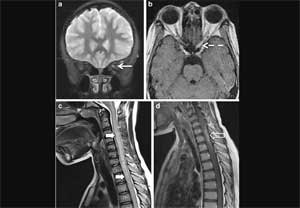- Home
- Editorial
- News
- Practice Guidelines
- Anesthesiology Guidelines
- Cancer Guidelines
- Cardiac Sciences Guidelines
- Critical Care Guidelines
- Dentistry Guidelines
- Dermatology Guidelines
- Diabetes and Endo Guidelines
- Diagnostics Guidelines
- ENT Guidelines
- Featured Practice Guidelines
- Gastroenterology Guidelines
- Geriatrics Guidelines
- Medicine Guidelines
- Nephrology Guidelines
- Neurosciences Guidelines
- Obs and Gynae Guidelines
- Ophthalmology Guidelines
- Orthopaedics Guidelines
- Paediatrics Guidelines
- Psychiatry Guidelines
- Pulmonology Guidelines
- Radiology Guidelines
- Surgery Guidelines
- Urology Guidelines
Cetrizine may help prevent relapse of neuromyelitis optica

Dr.Ilana Katz Sand, MD, Assistant Professor of Neurology, Icahn School of Medicine at Mount Sinai, New York, and associates in a pilot, open-label, add-on trial have found that addition of cetirizine to standard therapy is safe, well-tolerated, and may reduce relapses in patients with neuromyelitis optica. Neuromyelitis Optica (NMO) is a rare and severe disease that causes inflammation and demyelination primarily in the optic nerve, spinal cord, and brainstem.
This pilot, open-label, add-on trial of cetirizine followed 16 NMO patients taking 10mg/day of orally administered cetirizine for one year.Participants were enrolled/followed from April 2014- February 2016.The study measured the ARR of patients prior to starting cetirizine compared with after taking cetirizine.Participants started cetirizine 10mg orally daily and continued for one year, in addition to their established NMOSD disease-modifying therapy. They were monitored for new neurologic episodes and potential adverse events related to the study drug. Formal relapse assessments, as well as the Epworth Sleepiness Scale, were completed at 3, 6, 9 and 12 months.
The primary endpoint was the annualized relapse rate (ARR) while on the same disease-modifying therapy before starting cetirizine compared with after taking cetirizine. The ARR before cetirizine was 0.4±0.80 and after cetirizine was 0.1±0.24 (p=0.047).
It was concluded that Cetirizine is safe, well-tolerated, and may help prevent relapses in NMO. The open-label design and small sample size in this trial preclude definitive conclusions; however, these results warrant further study. Cetirizine given chronically may be able to prevent the activation and chemotaxis of eosinophils and other inflammatory cells, should the beginning of a relapse cascade occur; however, a larger sample size with more frequent specimen collection would be required to determine this definitively.
Current standard treatments for NMO have focused on lymphocytes; however, granulocyte infiltration has been shown to play an important role in NMO-related inflammatory destruction. In addition to its antihistaminic functions, cetirizine is known to have eosinophil-stabilizing properties. Cetirizine also has a myriad of effects on other immune system components, including inhibition of lymphocyte and monocyte chemotaxis. Animal model work demonstrated that the development of NMOSD-type lesions could be blocked with the administration of cetirizine, so it was exciting to see if it might be safe and effective for human NMO patients.
Said Mount Sinai's Dr. Ilana Katz Sand of the research:"We were pleased to find that cetirizine was safe and well-tolerated in our population of NMO patients. While the study's open-label design and small sample size preclude definitive conclusions, we did detect a signal that suggested cetirizine may be of benefit. We look forward to future research on this topic."

Disclaimer: This site is primarily intended for healthcare professionals. Any content/information on this website does not replace the advice of medical and/or health professionals and should not be construed as medical/diagnostic advice/endorsement or prescription. Use of this site is subject to our terms of use, privacy policy, advertisement policy. © 2020 Minerva Medical Treatment Pvt Ltd